- Home
- Martin Amis
Einstein's Monsters Page 2
Einstein's Monsters Read online
Page 2
Three books on SDI-three quickies on the end of time -have recently landed on my desk, two pro and one anti. How to Make Nuclear Weapons Obsolete is by Robert Jastrow, the man who jumped into newsprint the day after the space-shuttle disaster with the comment, "It's almost fishy." First, Jastrow makes it clear how much he hopes that World War III can, if possible, be avoided, how much he would regret and deplore such an eventuality (the tone is the familiar one of hurried moral gentrification, as if this were all a wearisome matter of etiquette and appearances); he then addresses himself to the main business of the book, a stirred account of "The Battle." Here in the midst of the techno-philiac space-opera we glimpse the president coolly "ordering" this and "deciding" that, coolly erecting his untried "peace shield" as hemispherical butchery looms in the skies above. In fact the president, if he has not been vaporized by a suitcase bomb in the Russian embassy, will be understandably immersed in his own nervous breakdown, along with every other actor in this psychotic fantasy. For Jastrow, the unthinkable is thinkable. He is wrong, and in this respect he is also, I contend, subhuman,, like all the nuclear-war fighters, like all the "prevailers." The unthinkable is unthinkable; the unthinkable is not thinkable, not by human beings, because the eventuality it posits is one in which all human contexts would have already vanished. SDI can never be tested, and neither can the actors. How they would respond at such a time is anyone's guess. But they would no longer be human beings. In a sense, nobody would be. That status does not exist on the other side of the firebreak.
Solly Zuckerman has suggested that the Allies' complaisance on SDI, lukewarm and hangdog though it was, could not have survived a reading of Jastrow. Probably the same could not be said for Alun Chalfont, whose Star Wars: Suicide or Survival? welcomes SDI in the baritone of gruff realism. True, the Initiative will entail "high risk"; true, the Initiative "calls for an entirely new approach to the doctrines underlying arms control policies"; true, the Initiative will cost a trillion dollars. But it's worth it. Highly risky, entirely revolutionary, and incredibly expensive, it's worth it -because of the Gap. The Soviets will soon be doing it, or have started doing it, or (he sometimes seems to suggest) have already done it. So we'd better do it too… Interestingly, what exercises Lord Chalfont is not the existence of nuclear weapons, an existence which, he says, cannot be "repealed." [1] What exercises Lord Chalfont is the existence of their opponents. Now here is something we can get rid of. Civility, in any case, absents itself from his prose whenever the subject of peace-or "peace"-is wearily introduced. "Immediately the peace industry begins its predictable uproar… a coalition of misguided idealists, with a sprinkling of useful idiots and Soviet agents (conscious and unconscious)." Annoyed by references to the war "industry," he nonetheless accords industrial status to the peace movement. Why? Where are the factory townships of peace? Where are its trillion-dollar budgets? At one point Chalfont discusses American plans for the deployment of enhanced radiation warheads in Europe… there is, at once, an uproar against the "neutron bomb"-described by the mentally enfeebled as a capitalist weapon, designed to kill people but preserve property.
Chalfont isn't happy with the phrase "capitalist weapon," and one concurs. But how happy is he with "enhanced radiation warheads"? How happy is he with "enhanced"?
E. P. Thompson is unfortunately not much nearer to finding the voice of appropriate and reliable suasion. He has made great sacrifices for the cause he leads; he is brilliant, he is charismatic, he is inspiring; but he is not reliable. In Star Wars, as elsewhere, Professor Thompson shows himself to be the fit exponent of the nuclear High Style. He is witty and grand, writing with the best kind of regulated hatred. How devastating he is, for example, on the SDI public-relations effort. From the confidential literature:
Innumberable opportunities for highly visible "cause" activism could be opened up… interest to Catholics also… Such a ratification effort would permit the White House to look good in confronting powerful anti-BMD domestic critics… addresses "Eurostrategic" issues, which are big today… play freely on high-road ethical themes (by far the best mobilizational approach)…
Thompson is devastating about SDI; his case is well-nigh complete. But he will devastate nobody-indeed, he may even subvert the converted-because he has no respect for tone.
His tone is lax, impatient, often desperately uncertain; it is excitedly alarmist; it takes pleasure in stupidity. His anti-Americanism ("the US of A is inherently moral," "President of Planet Earth," "I want you Commies to come out with your hands up") is as dated and grueling, and as much a matter of stock response, as the counterprejudices of Lord Chalfont. Thompson also makes jokes. He likes this joke so well that he cracks it twice:
Already, the soon-to-be President warned, the window [of vulnerability] might be so wide open that "the Russians could just take us with a phone call." "Hallo! Mr. Reagan, is zat you? Tovarich Brezhnev here. Come on out with your hands up, or I put zis Bomb through the window!"
Everything in you recoils from this. You sit back and rub your eyes, wondering how much damage it has done. For in the nuclear debate, as in no other, the penalty for such lapses is incalculable. Human beings are unanimous about nuclear weapons; human institutions are not. Our hopes lie in a gradual symbiosis. We must find the language of unanimity.
I argue with my father about nuclear weapons. In this debate, we are all arguing with our fathers. They emplaced or maintained the status quo. They got it hugely wrong. They failed to see the nature of what they were dealing with- the nature of the weapons-and now they are trapped in the new reality, trapped in the great mistake. Perhaps there will be no hope until they are gone. Out on the fringes there are people who believe that we ought to start killing certain of our fathers, before they kill us. This reminds me of the noble syllogism (adduced by Schell) of Failed Deterrence: "He, thinking I was about to kill him in self-defense, was about to kill me in self-defense. So I killed him in self-defense." Yes, and then he killed me in retaliation, from the grave. Our inherited reality is infinitely humiliating. We must try to do a little better.
My father regards nuclear weapons as an unbudgeable given. They will always be necessary because the Soviets will always have them and the Soviets will always want to enslave the West. Arms agreements are no good because the Soviets will always cheat. Unilateral disarmament equals surrender. And anyway, it isn't a case of "red or dead." The communist world is itself nuclear-armed and deeply divided: so it's a case of "red and dead."
Well, dead, at any rate, is what this prescription seems to me to promise. Nuclear weapons, my father reminds me, have deterred war for forty years. I remind him that no global abattoir presided over the century-long peace that followed Napoleon's discomfiture in 1815. And the trouble with deterrence is that it can't last out the necessary time-span, which is roughly between now and the death of the sun. Already it is falling apart from within. When I say that America is as much of a threat as the Soviet Union my father categorizes me as someone who takes democracy lightly, who takes freedom lightly. But of course it is the weapons themselves that are the threat. Ironically, an autocracy is much the better equipped to deal with this question, because the question is superpolitical. There is no one for the Soviets to deal with-leaders of sharply deteriorating caliber, beset by democracy, by politics, and doing six-month stints between midterm elections, lame-duck periods, and the informal referenda of American public life. And there is money, the money. It would seem, at the time of writing, that the Soviet Union can't afford to go on and that the United States can't afford to stop. Saul Bellow has written that there are certain evils-war and money are the examples he gives-that have the power to survive identification as evils. They cheerfully continue, as evils, as known evils. Could it be a further accomplishment of nuclear weapons that they have united these continuations, in a process of terminal decay? So the world ends in the same way The Pardoner's Tale ends, with the human actors gone, leaving behind (though no one will find them) the spent weapons and the
unspent money, the weapons and the money.
Anyone who has read my father's work will have some idea of what he is like to argue with. When I told him that I was writing about nuclear weapons, he said, with a lilt, "Ah. I suppose you're… 'against them,' are you?" Epater les bien-pensants is his rule. (Once, having been informed by a friend of mine that an endangered breed of whales was being systematically turned into soap, he replied, "It sounds like quite a good way of using up whales." Actually he likes whales, I think, but that's not the point.) I am reliably ruder to my father on the subject of nuclear weapons than on any other, ruder than I have been to him since my teenage years. I usually end by saying something like, "Well, we'll just have to wait until you old bastards die off one by one." He usually ends by saying something like, "Think of it. Just by closing down the Arts Council we could significantly augment our arsenal. The grants to poets could service a nuclear submarine for a year. The money spent on a single performance of Rosenkavalier might buy us an extra neutron warhead. If we closed down all the hospitals in London we could…" The satire is accurate in a way, for I am merely going on about nuclear weapons; I don't know what to do about them.
We abandon the subject. Our sessions end amicably. We fall to admiring my one-year-old son. Perhaps he will know what to do about nuclear weapons. I, too, will have to die off. Perhaps he will know what to do about them. It will have to be very radical, because there is nothing more radical than a nuclear weapon and what it can do.
Another satirical voice in the debate is that of Civil Defense. Unlike Professor Thompson's, these jokes are funny. Civil Defense Against Nuclear Attack-the concept is a joke in itself. There are only two words to be said, and they are forget it. Nevertheless, books on this subject continue to appear. I suppose someone has to write them, but the whole genre is scuppered by subhuman bathos. It is like trying to acquaint the Royal Family with the consolations of life in a blood-soaked lean-to, or a medieval field hospital. (And, against this particular backdrop, every family is a royal family.) In the nuclear hospital, by another feral irony, there will be a reversed triage: only the comparatively healthy are considered treatable. The process of nuclear inversion is complete when one realizes that the correct attitude to nuclear war is one of suicidal defeatism. Let no one think that it is thinkable. Dispel any interest in surviving, in lasting. Have no part of it. Be ready to turn in your hand. For myself and my loved ones, I want the heat, which comes at the speed of light. I don't want to have to hang about for the blast, which idles along at the speed of sound. There is only one defense against nuclear attack, and that is a cyanide pill. Recently I came across an American offering, Civil Defense in Nuclear Attack: A Family Protection Guide by Capt. T. Kalogroulis. It is a peach. It is also full of illiteracies and misprints ("A schematic illustration of the blast wave is shown in the neat page?"). But I imagine we can live with that. After a nuclear attack, I imagine we can live with a few misprints. The book begins with the Justification-the justification for all this ghoulish prattle. "The Communist aim is world domination… they will use nuclear blackmail based on their boasted capabilities. And they are prepared to use force if they need to and can afford the risk." That if is not a big one, because the Soviets "might accept a risk in human and property losses that we would not consider risking. They are hardened to losses." The enemy is not made of flesh and blood but of hide and ice; to them, nuclear holocausts are meat and drink. Over the page, Captain Kalogroulis lists the "strategic advantages of population protection." There are seven of them. Number four states that "protection of the people gives meaning to all military defense; the latter has no meaning if the populations perishes." What meaning does the former have, if the population perishes? Here is number five:
Our leading military authorities agree that ability to limit our casualties in event of an attack has definite military advantages. It would mean that an enemy must commit greater military and economic strength to the venture. It would thus take him longer to attain capability.
In other words, the enemy would have to go to extra trouble in rendering the casualties unlimited. One wonders, too, how much clout and prestige our leading military authorities would really enjoy, "in event of an attack." Number seven concludes that population protection "creates ability to endure a nuclear war." One is obliged to pull through, then, for strategic reasons.
The clear truth is that after a nuclear war the role of the civil and military establishment would change or invert. The authorities would no longer be protecting the population from the enemy: they would be protecting themselves from the population.One of the effects of nuclear weapons -these strange instruments-would be instant fascism. In 1980 the British government conducted Operation Square Leg, in conjunction with NATO, to assess the realities of nuclear attack. Together with many other mysterious assumptions (seven-day warning, no detonation in central London), it is imagined that the populace would spend its last week stocking up with food and turning its back gardens into shelters-in other words, digging its own grave. Because when you stagger out of your shelter, following the "All Clear" (all clear for what?), the only thing worth doing would be to stagger back in again. Everything good would be gone. You would be a citizen of a new town called Necropolis. Nuclear civil defense is a nonsubject, a mischievous fabrication. It bolsters fightability. It bolsters thinkability.
For all its black slapstick, however, the genre has a plangent undertow. Not everyone (by definition) is as thoroughly, as exemplarily subhuman as Captain Necropolis. The admirable London After the Bomb, for instance, starts off as a book "about" nuclear defense and ends up as a disgusted rejection of nuclear defense. Even with semiofficial publications like Nuclear Attack: Civil Defence (Commissioned and Edited by the Royal United Services Institute for Defence Studies) you get the following impression: that of a team of experienced paramedics, well prepared for a vicious assault on their senses, who then find themselves reeling from the scene of the accident, in helpless nausea. Language cannot live with this reality. "It is important to have a good supply of painkillers… tranquilizers will be important… psychological problems in a nuclear war… health problems in a nuclear war…" Is problems really the word we want? Well, there will be extinction problems too, as- with aspirin tablets, four-by-four-inch sterile pads, small scissors (blunt ended) and a provident supply of safety pins -we hunker down for the nuclear winter.
Nuclear winter has been the best news on this front since 1945. It is the best news because it is the worst news (and because nuclear realities are always antithetical or palindromic). To put the matter simply, if a considerable fraction of the world's arsenals were used, the planet might cease to support life. Thus even a successful first strike might fatally redound upon the attacker. It took nearly forty years to grasp an obvious truth: that there is no fire without smoke. How long will it take us to grasp that nuclear weapons are not weapons, that they are slashed wrists, gas-filled rooms, global booby traps? What more do we need to learn about them? Some people-and it does take all sorts, to make a world-are skeptical about nuclear winter; extinction is something they feel they can safely pooh-pooh. Certainly the case is not proven: like every other nuclear ramification, it pullulates with uncertainty. (The chemistry of ozone creation and destruction, for example, is only partially understood.) But the pessimistic view would seem to me to be the natural one. Where are the hidden pluses, where are the pleasant surprises, when it comes to nuclear weapons? Anyway, the ethical argument remains watertight. If the risk is infinite-as Schell points out in The Fate of the Earth-a scientific possibility can be treated as a moral certainty, "because if we lose, the game will be over, and neither we nor anyone else will ever get another chance." Or, as he puts it in his later book, The Abolition:
For now human beings, engaged, as always, in the ambitions and disputes of their particular place and time, can end the human story in all places for all time. The eternal has been placed at stake in the temporal realm, and the infinite has been delivered into
the care of finite human beings.
And it makes imaginative sense, I think, that the enchanting mysteries of matter, of quanta, should encode an ending (the atom itself being no more than a set of relationships). Mathematically the universe is a fluke. So is the earth, this blue planet, and so is organic life. Though each confirmation is welcome, we do not need the Friends of the Earth or The Tao of Physics to tell us that in our biosphere everything is to do with everything else. In that they are human, all human beings feel it-the balance, the delicacy. We have only one planet, and it is round.
The central concept in nuclear-winter theory is synergism. When two bad things happen, a third (and unpredictable) bad thing happens, exceeding the sum of the individual effects. This is on top of the bad things we know a good deal about, already quite a list. Prompt radiation, superstellar temperatures, electromagnetic pulse, thermal pulse, blast overpressure, fallout, disease, loss of immunity, cold, dark, contamination, inherited deformity, ozone depletion: with what hysterical ferocity, with what farcical disproportion, do nuclear weapons loathe human life… It is possible to imagine nuclear synergisms multiplying into eternity, popping and crackling away, inimical to life even when there is nothing left to be inimical to. The theory of nuclear winter was prompted by studies of dust storms on Mars, and Mars gives us a plausible vision of a postnuclear world. It is vulcanized, oxidized, sterilized. It is the planet of war.

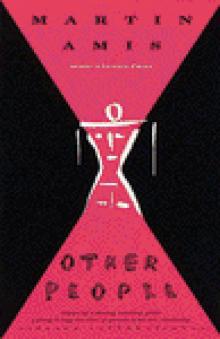 Other People
Other People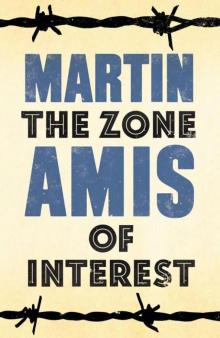 The Zone of Interest
The Zone of Interest The Rub of Time: Bellow, Nabokov, Hitchens, Travolta, Trump
The Rub of Time: Bellow, Nabokov, Hitchens, Travolta, Trump Koba the Dread
Koba the Dread Success
Success London Fields
London Fields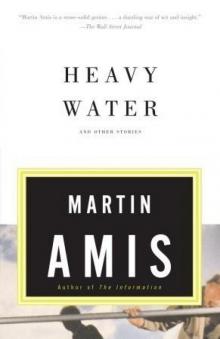 Heavy Water: And Other Stories
Heavy Water: And Other Stories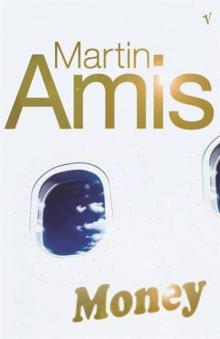 Money
Money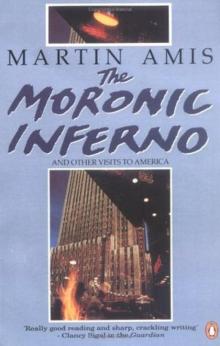 The Moronic Inferno and Other Visits to America
The Moronic Inferno and Other Visits to America Yellow Dog
Yellow Dog Time's Arrow
Time's Arrow Experience: A Memoir
Experience: A Memoir Einstein's Monsters
Einstein's Monsters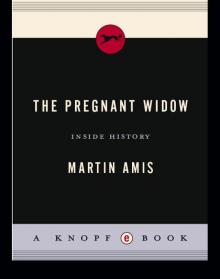 The Pregnant Widow
The Pregnant Widow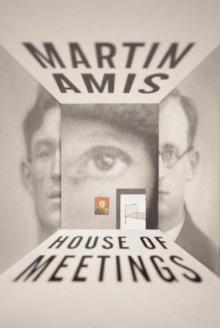 House of Meetings
House of Meetings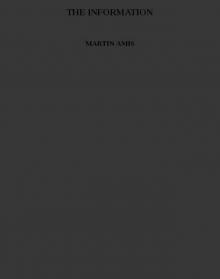 The Information
The Information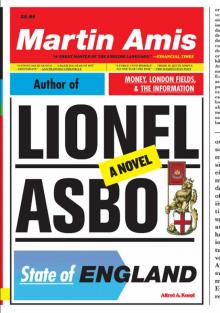 Lionel Asbo: State of England
Lionel Asbo: State of England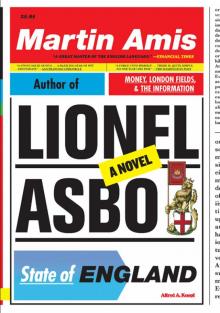 Lionel Asbo
Lionel Asbo Heavy Water and Other Stories
Heavy Water and Other Stories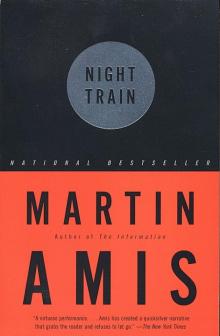 Night Train
Night Train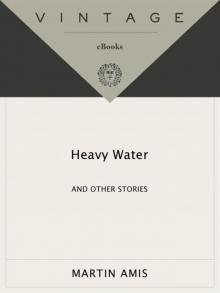 Heavy Water
Heavy Water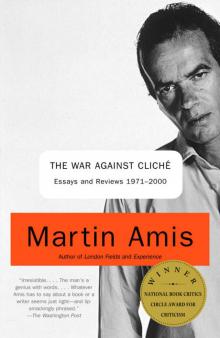 The War Against Cliche: Essays and Reviews 1971-2000 (Vintage International)
The War Against Cliche: Essays and Reviews 1971-2000 (Vintage International)